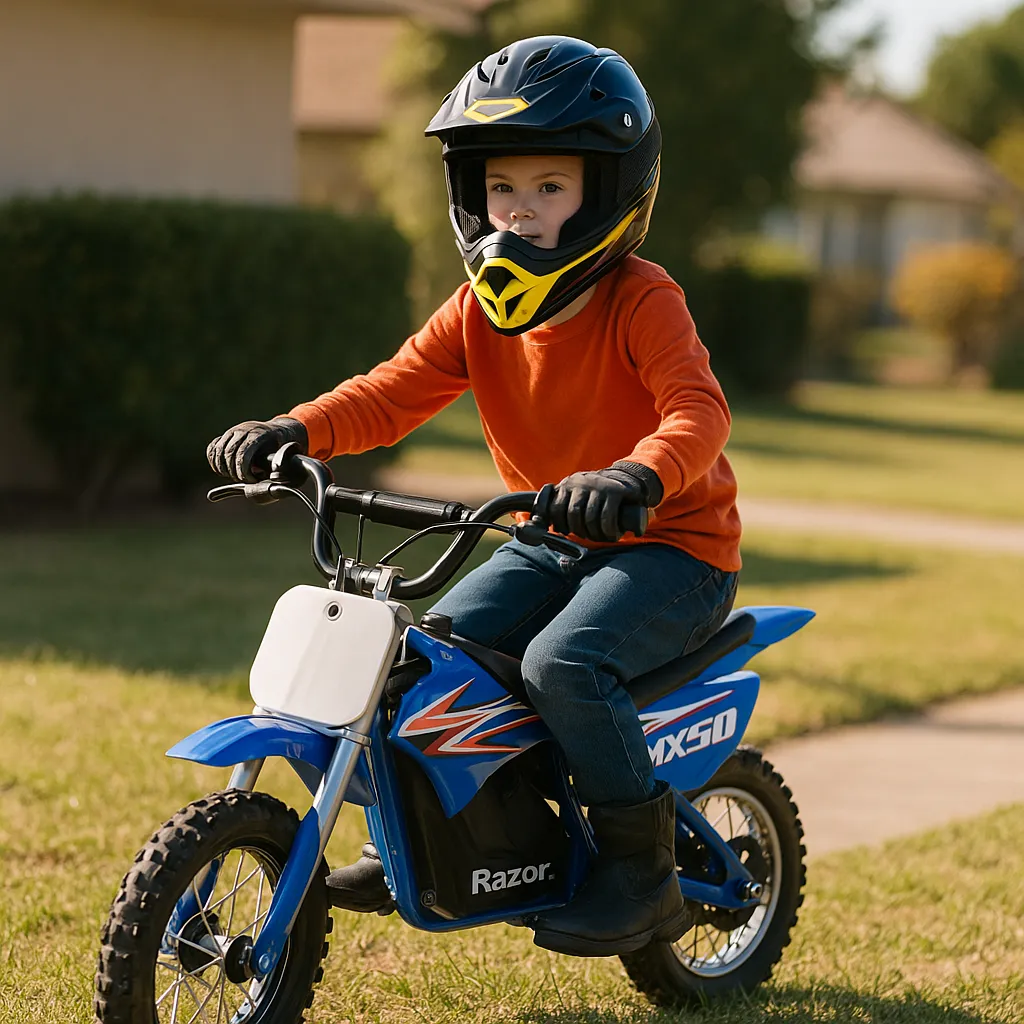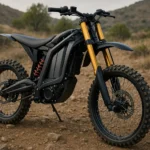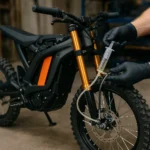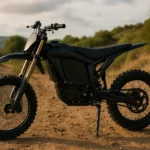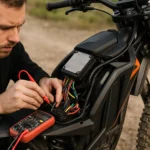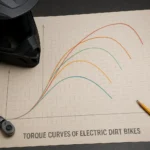Electric dirt bikes for kids are everywhere — from backyards to bike parks to your social media feed. But the big question parents keep asking is: are kids electric dirt bikes legal? The answer isn’t as simple as yes or no.
⚠️ It depends on a mix of local laws, the type of bike, and where the child is riding it.
Many families buy these bikes thinking they’re just high-powered toys. But in the eyes of the law, kids electric dirt bikes can sometimes be classified as motor vehicles.
That means regulations may kick in — like needing a license, wearing helmets, or even registering the bike with the DMV in some states.
So, are you risking a fine or worse by letting your kid zoom around the neighborhood? Or are you safe as long as they stay on private property?
In this full guide, we’ll explore are kids electric dirt bikes legal, break down the confusing rules, and give you peace of mind before you hit “buy now.”
Whether you’re a parent, grandparent, or young rider looking to convince mom and dad — you’ll get the full scoop on kids dirt bike legality in the U.S., what to look out for, and how to ride safely and legally.
Key Takeaways
- Legal rules for kids’ electric dirt bikes vary by state, age, and terrain
- Some bikes are technically toys, while others fall under motor vehicle laws
- Understanding local rules helps you avoid fines or accidents
- We’ll also cover safety tips and trusted places to buy street-legal options
⚡ What You’ll Learn in This Guide: Use the quick links below to jump to the section you need most 👇
What Counts as a Kids’ Electric Dirt Bike?
Before diving deeper into laws, let’s clarify something critical: what exactly qualifies as a kids’ electric dirt bike?
When asking are kids electric dirt bikes legal, this is where it all begins — because how the bike is classified affects everything from age limits to where it can be ridden.
Age Range and Bike Classification
Generally, electric dirt bikes made for kids are designed for ages 5 to 15. These bikes usually have smaller frames, limited top speeds, and reduced power output compared to adult versions.
But here’s the catch: just because a bike is marketed to kids doesn’t mean it’s street legal — or legal to ride in public spaces at all.
Legally speaking, there are usually three informal categories:
| Type | Typical Use | Max Speed | Power (Watts) | Legal Status |
|---|---|---|---|---|
| Toy Electric Dirt Bikes | Home/backyard | < 10 mph | ~250W | Often unregulated |
| Youth Off-Road E-Bikes | Trails/private land | 10–20 mph | 250W–1000W | Restricted in public spaces |
| High-Powered Youth Models | Track/off-road only | 20+ mph | 1000W+ | Treated as motor vehicles |
Many parents assume if the bike is small and slow, it’s totally fine — but laws don’t always care about size. The real legal test is how the bike behaves.
Can it go over 20 mph? Does it have pedals? Does it resemble a motorcycle in how it operates?
If the answer is yes, then in many places, are kids electric dirt bikes legal becomes a serious question — and often the answer is no, at least for public use.
Common Models and Legal Considerations
Let’s look at two popular electric dirt bikes designed for kids:
- Razor MX350: With a top speed of around 14 mph and low wattage, it’s often considered a toy. Legal to ride on private property without special requirements.
- Kuberg Start: Higher torque and build quality. Meant for young riders but may exceed local safety thresholds.
So, are kids electric dirt bikes legal if you stick to these models? Again — only on private property unless your state has specific laws allowing limited public use.
Many parents are surprised to learn that bikes exceeding 750W or 20 mph could legally require registration — even for kids.
That’s why it’s important to check how your local laws define “low-speed electric bicycles” versus “motorized dirt bikes”.
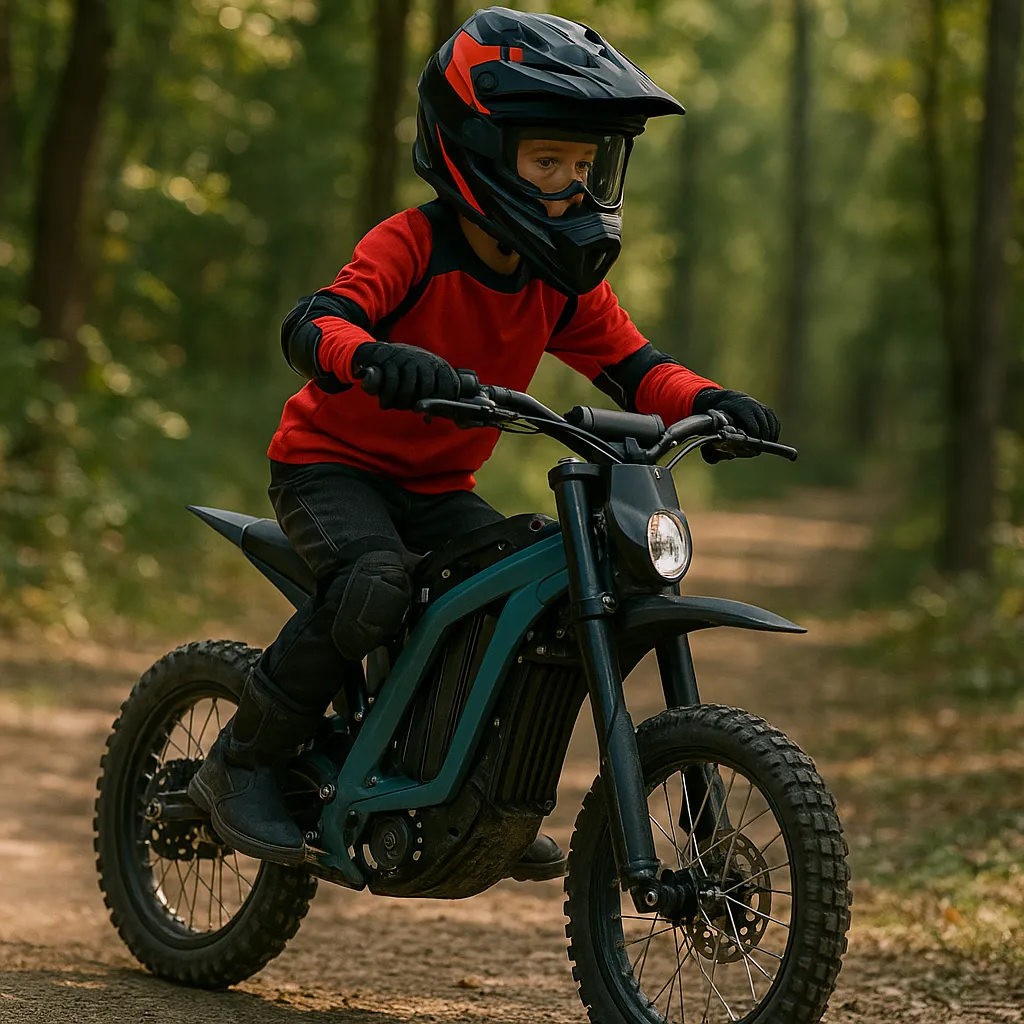
Where Can Kids Ride Electric Dirt Bikes?
So you found the perfect e-bike and your kid’s ready to roll — but hold up. Even if it’s designed for young riders, are kids electric dirt bikes legal to ride anywhere? Not exactly.
This is where most parents get caught off guard. The laws don’t just depend on the bike — they depend on where it’s being used.
Riding around your backyard is one thing. Tearing down the neighborhood sidewalk? That’s a whole other story.
Private Property: The Safe Zone
If you own or have access to private land, good news: that’s where kids electric dirt bikes shine the brightest.
No need for licenses, registration, or permits in most areas. Your kid can rip around a dirt track, practice jumps, or learn balance skills safely under your supervision.
But — and this is important — private land means fenced-in or clearly owned property. Empty lots or school yards don’t count, even if they look abandoned.
This is the safest, most legally sound option when the question is are kids electric dirt bikes legal to ride without stress.
Public Roads, Sidewalks, and Parks: Danger Zones
The moment your child takes their e-dirt bike onto a sidewalk, street, or even a park path, things change — fast.
Most municipalities classify these areas as public rights-of-way, and that brings in vehicle codes and enforcement.
Even small electric bikes (like the Razor MX350) are often not allowed on:
- 🛣️ Roads (unless registered and insured)
- 🚸 Sidewalks (safety hazard for pedestrians)
- 🌳 Parks or trails maintained by city/state
That means even a “toy” could be illegal in public if it’s powered and has no pedals. So if you’re wondering are kids electric dirt bikes legal in my neighborhood, your best bet is to check with your local traffic or parks department.
State-by-State Legal Differences
In the U.S., traffic laws vary widely. Some states offer clear rules for youth e-bikes — others don’t even mention them. Here are a few examples:
| State | Minimum Age | Street Legal? | Helmet Required? |
|---|---|---|---|
| California | 16 (Class 3 only) | No (under 750W) | Yes |
| Texas | No specific law | No | Yes (under 18) |
| Florida | 16 (Class 2/3) | No (if no pedals) | Yes |
| New York | Varies by city | Rarely | Yes |
🔗 Looking for a deeper breakdown by state? Check out our full guide:
Are Electric Dirt Bikes Street Legal?
Do Kids Need a License or Registration?
Here’s where things get tricky. Even if you’ve already asked are kids electric dirt bikes legal, you might not have considered whether your child technically needs a license, registration, or insurance to ride one. Unfortunately, in some states — they just might.
Let’s break it down.
When Are Electric Dirt Bikes Considered Motor Vehicles?
The classification depends on key specs like:
- Top speed (usually over 20 mph triggers regulation)
- Motor power (above 750W often causes legal issues)
- Whether or not it has pedals
- Where it’s being ridden (public vs private land)
If your kid’s bike exceeds local thresholds, it might no longer be considered a toy. Instead, it could fall under the “low-speed electric vehicle” or even “motorcycle” category in your state DMV’s eyes.
This can mean registration, insurance, or even a special license is required — regardless of the rider’s age.
According to the U.S. Consumer Product Safety Commission, electric ride-on vehicles for children must meet federal safety standards — but that doesn’t make them street legal. Local and state laws still apply, especially for public use.
That’s a huge deal for families asking are kids electric dirt bikes legal, especially if the model looks harmless.
Are Kids Ever Required to Have a License?
Most states do not allow minors under 16 to operate any motorized vehicle on public roads — even if it’s electric and underpowered. That means kids:
- Can’t legally register an e-dirt bike in their name
- Can’t ride on public streets without adult supervision (in most areas)
- May require an adult to assume legal responsibility if something goes wrong
Some exceptions apply in off-road zones, private motocross parks, or trails specifically designed for youth riders. But again — this depends on your local laws.
Insurance & Liability for Parents
Even if the bike doesn’t need registration, it doesn’t mean you’re off the hook. If your kid hits a parked car or injures someone while riding, you might be liable — and your homeowner’s insurance may or may not cover it.
Important questions to ask yourself:
- Are you comfortable with the legal gray area?
- Have you checked with your insurance provider about liability?
- Would your coverage apply if your kid was off your property?
Understanding these points helps you answer not just are kids electric dirt bikes legal, but are they a smart choice for your family from a risk perspective.
Legal Age Restrictions and Helmet Laws
Even if you’ve already found the perfect ride and a safe place to use it, you still need to ask: are kids electric dirt bikes legal for every age group?
The answer depends heavily on your location — and whether proper gear is worn.
Let’s look at the two biggest factors: age restrictions and helmet laws.
Minimum Age Requirements by State
Some states are very clear: kids under a certain age simply cannot ride motorized vehicles in public areas, even if the bike is small and electric. Others are more relaxed, leaving room for interpretation or deferring to local ordinances.
Here’s a simplified breakdown of what you might encounter:
| State | Minimum Age for E-Dirt Bikes | Public Use Allowed? |
|---|---|---|
| California | 16 (Class 3 bikes only) | No (for younger kids) |
| Florida | 16 (motorized vehicles) | Rarely |
| Texas | No statewide rule | Varies by city/county |
| New York | Varies by borough | Often prohibited |
| Ohio | 14 with supervision (off-road) | Off-road only |
If your child is under 14, you’re almost certainly limited to private property riding. This is crucial when wondering are kids electric dirt bikes legal in your area — especially for younger children under 10.
Mandatory Helmet and Safety Equipment
Almost all U.S. states require helmets for riders under 18 — whether on dirt bikes, scooters, or electric bicycles. In fact, failure to wear a helmet can result in fines for parents or guardians in some places.
Beyond helmets, many riding schools and experts recommend:
- Gloves (to prevent hand injuries during falls)
- Knee and elbow pads (a must for beginners)
- Full-face helmet (for higher-powered bikes or trails)
- Boots with ankle support (for extra protection)
Wearing the right gear doesn’t just reduce injuries — it shows you’re serious about safety. And in some cities, law enforcement might overlook minor infractions if they see the child is well-equipped and supervised.
So if you’re wondering again are kids electric dirt bikes legal, the answer may lean more toward yes when helmets and proper gear are part of the equation.
Are Electric Dirt Bikes for Kids Ever Street Legal?
This is one of the most common questions we hear — and one of the most misunderstood. Parents want to know: are kids electric dirt bikes legal to ride on streets, sidewalks, or even to school?
In most cases, the answer is a hard no — and here’s why.
Why Most Kids’ E-Dirt Bikes Aren’t Street Legal
To be legally driven on public roads, any motorized vehicle needs to meet basic DOT (Department of Transportation) standards. That includes:
- Working headlights and taillights
- Brake lights and turn signals
- Side-view mirrors
- Horn
- Vehicle Identification Number (VIN)
- Proper registration and insurance
Now think about the average kids’ electric dirt bike — even the high-end ones like the Kuberg Start or Razor SX500.
Do they have mirrors? A horn? Turn signals? Nope. They’re built for fun and off-road use, not public road safety.
So even though they’re small and look harmless, the law still applies. And that’s why the answer to are kids electric dirt bikes legal for street riding is generally no — unless the bike has been specifically modified and inspected.
Modifying Bikes for Legal Use (and Why It’s Risky)
Some adventurous parents try to modify youth bikes to make them “street legal.” They add lights, a horn, maybe even mirrors and a speedometer.
⚠️ Here’s the problem: modding doesn’t equal approval.
You can’t just add a headlight and assume the cops will look the other way. The vehicle still needs to pass inspection, have a VIN, and meet emission and safety standards — all of which are nearly impossible with entry-level kids’ e-bikes.
In short: trying to “hack the system” could land you with fines, liability issues, or worse.
Even if you somehow sneak past the rules for a while, all it takes is one accident or complaint for legal trouble to roll in. It’s just not worth the risk.
So, for the parents asking are kids electric dirt bikes legal on streets, the only real option is don’t go there — stick to backyards, tracks, or off-road parks instead.
Common Myths About Kids’ Electric Dirt Bike Laws
By now, you’ve probably realized that the answer to are kids electric dirt bikes legal isn’t black and white.
Unfortunately, there’s a lot of misinformation floating around — especially in Facebook groups, YouTube comments, and, yep, even at the local park.
Let’s bust some of the most common myths parents believe (and repeat).
“It’s Small, So It Must Be Legal”
One of the biggest assumptions is that if a bike is physically small or looks like a toy, it can be ridden anywhere. But legality isn’t about size — it’s about power, speed, and location.
A 10-year-old on a 500W bike going 15 mph might still be breaking the law if they’re on public property.
In many cities, anything motorized — regardless of size — is banned from sidewalks, bike paths, and streets unless it’s classified and registered correctly.
So just because it fits in the garage doesn’t mean it fits in the law.
“My Neighbor’s Kid Rides on the Sidewalk, So We Can Too!”
This one’s a classic. We totally get it — if you see other kids zooming around the block, it feels safe to assume it’s okay. But just because others are getting away with it doesn’t mean it’s actually legal.
In fact, many parents don’t realize they’re putting their kids at risk of:
- Getting ticketed or fined
- Having the bike confiscated
- Causing an accident with pedestrians or vehicles
So next time you’re tempted to follow the crowd, ask yourself: Are kids electric dirt bikes legal here — or am I just hoping for the best?
“If It’s Sold at Walmart or Amazon, It Must Be Street Legal”
Nope. Retailers aren’t responsible for telling you where or how a bike can be used. That falls on you, the buyer.
Many bikes sold online or in big box stores are labeled for off-road use only, even if that’s buried in the fine print.
So don’t let slick marketing fool you. A cool description doesn’t mean the bike’s legal for your kid to ride around the block.
Always check local ordinances and verify if your chosen model is certified for public use — especially if you’re serious about avoiding fines or unwanted attention.
FAQs: Real Questions from Parents & Young Riders
We’ve seen this topic spark heated debates in parent forums, rider groups, and even school parking lots. Let’s settle it. Here are the most common questions we get from people wondering: are kids electric dirt bikes legal?
Q1: Are kids electric dirt bikes legal on sidewalks?
In most U.S. cities, no. Sidewalks are considered pedestrian zones, and any motorized vehicle — even low-powered ones — is usually prohibited. If the bike has a motor and no pedals, it’s likely not allowed, even if it’s being ridden by a child.
Q2: What age can a child legally ride an electric dirt bike?
It varies by state. Some don’t allow riders under 16 on anything motorized in public spaces. Others let younger kids ride off-road with supervision. The golden rule? If your kid is under 14, it’s safest to keep riding confined to private property or approved trails.
Q3: Can kids ride electric dirt bikes in national parks or public trails?
Rarely. Most national parks ban motorized vehicles from non-paved trails. Some local off-road parks and motocross tracks do allow kids’ electric dirt bikes — but only with helmets and under adult supervision.
Q4: Do all kids’ electric bikes need to be registered?
Not all — but many do if they exceed power or speed limits. Bikes with motors over 750W or that go faster than 20 mph often qualify as motor vehicles in the eyes of the law, which may require registration (and sometimes insurance).
Q5: Are there legal electric dirt bikes made just for kids?
Yes — but most are only legal for off-road use or on private property. Brands like Razor, Kuberg, and Burromax offer models designed with safety limits for younger riders. Still, “legal” doesn’t mean “street legal.”
Q6: Can a parent get fined if their kid rides illegally?
Absolutely. In many cities, parents are held responsible for any infractions caused by underage riders. This includes fines for unsafe operation, helmet violations, and riding in restricted areas.
These answers should help clear the air — but always remember: local laws come first. When in doubt, call your city’s transportation office and ask the real pros.
Final Thoughts and Legal Checklist for Parents
We’ve covered a lot, but here’s the bottom line: are kids electric dirt bikes legal? It depends — and the answer can change dramatically depending on your state, city, the type of bike, and where your kid rides it.
These bikes are an awesome way to introduce young riders to the world of motorsports. But without the right knowledge and precautions, they can also be a legal headache (and a safety risk).
So here’s your no-BS checklist to make sure you’re on the right track:
✅ Legal Checklist for Parents
- Know your local laws — Check your state’s DMV and city ordinances
- Stick to private property unless you’ve confirmed public use is allowed
- Choose age-appropriate bikes (under 750W, under 20 mph for most states)
- Equip your child with a helmet and full safety gear
- Supervise young riders whenever possible
- Never assume legality based on bike size or marketing claims
- Avoid public sidewalks and roads unless the bike is fully street legal
- Consult your insurance provider to understand liability
If you’re unsure about anything, take 10 minutes to call your local law enforcement or transportation office. One quick phone call can save you a ticket (or worse).
For a broader look at electric dirt bike rules that apply to all ages, don’t miss our full guide:
👉 Are Electric Dirt Bikes Street Legal?
Join the Conversation!
Have tips, stories, or local info about riding laws? Drop a comment below and help other parents out! 💡
Don’t forget to share this post with your riding crew — because safety (and legality) should always come first.

Tyler Brooks is the storyteller behind most of the content at Electric Dirt Zone. With over 10 years of experience in digital media and a lifelong love for off-road riding, he blends technical insight from the team with engaging, down-to-earth writing. When he’s not turning dusty trail rides into blog posts, you’ll probably find him snapping pics before things get too wild.

